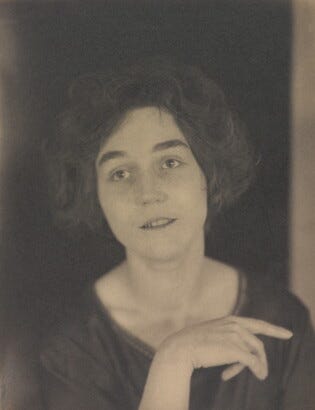—: Dedication :— And there were mirrors in every room: Full length; no bigger than the hand. Each one was set about with precious stones And some were broken.
—: Hymn To The Rockies :— The great hills rise majestic, Loving the ways of silence, The purple of deep shadows caught in a veil of blue; They know the peace of solitary meditation And the glamour of communing with their own souls . . .
—: Roads :— I love enchanting roads that curve Between tall rocks and trees, Little roads that nose them out A thousand mysteries Nor keep a straight and narrow path But wander where they please.
—: New England Sabbath :— Sunshine and asters, Sermons and pastors, Organs and singing And temple bells ringing. These and the swallows, Hilltops and hollows Incite us to riot O calm, Sabbath quiet!
—: Dusk: A Cinquain :— A tree Against the sky And then no tree at all But just an inky silhouette On grey.
Margaret Tod Ritter (1893-1986): “A native of Maryland, now lives in Colorado Springs.” (The Measure, 1925) “Member of Poetry Society of America and the Poetry Society of England. She refuses to give her age; 'Which,' she says, 'means I COULD be younger'; and she pronounces herself 'a perfectly charming person'.” (Overland Monthly & Out West, 1924)
“In writing of Margaret Tod Ritter, Mildred Watson speaks of Ritter as having a rightful place in the company of such poets as Edna St. Vincent Millay, Sarah Teasdale, and Joyce Kilmer. May I add that she seems also to be considerably indebted to Adelaide Crapsey, who is said to have originated the cinquain form, so admirably used by Ritter... It is a pleasure to see signs of influence coming from such beautiful and perfect work as that of the late Crapsey, and I am hoping to see more examples of that interesting form, the cinquain.” (Grace K. Wadleigh, in The Literary Digest, 1925)
I am not sure why reading Margaret Ritter’s work lead me down this path, but there’s no stopping a poem once it wants to be written, and this is what arrived. It’s a hard world at the moment, on so many fronts. Lots of love to everyone, and to use a phrase Laurence and I coined, riffing on the well-known feminist maxim, to remind ourselves of one of the roles of poets in times of difficultly: the personal is the political is the poetical!
—: After Margaret Tod Ritter :— by Dick Whyte I. & what if the world ended & this was the last poem anyone ever wrote II. first we used sticks & then stones & then swords & then guns & then bombs & then III. as a child i used to dream of a field harvested by hand just before it happened IV. should we sing of pain? yes! should we sing of joy? yes! should we sing? yes! V. & all that is left to say is sorry, sorry for not being kinder sooner
Forgotten Poets Presents:
Forgotten Poems, a living anthology of obscure and out-of-print poetry from the late-1800s and early-1900s. Explore the archives:
Henry Bellamann - Sand Hills (1921)
—: Sand Hills :— The world is spread with rough grained silk, crumpled a little where the sky indents it and cuts off the view. The very old gods, long since tired of northern lights and seas...
Elsa Von Freytag-Loringhoven - Novemberday (1924)
Novemberday— Gold cold— Dust blue— On poplars— Green metal Death show— Last Leaves...
More from the Book of Lost Rhymes . . .
Albert Edmund Trombly - The Trees (1922)
—: The Trees :— I Through the afternoon the breeze Looses leafy tongues of trees. Nodding heads accentuate What the leaves articulate. Twilight comes; the windless air Stills the gossip stirring there...

















"And the glamour of communing with their own souls . . ."
~
Who knows why you found it appropriate to write that nice poem, but it does feel appropriate. It's probably something to do with her poetic spirit more than any of the themes or formats. She does seem to have been a gentle and observant soul...
An urgent need for kindness ❤️❤️